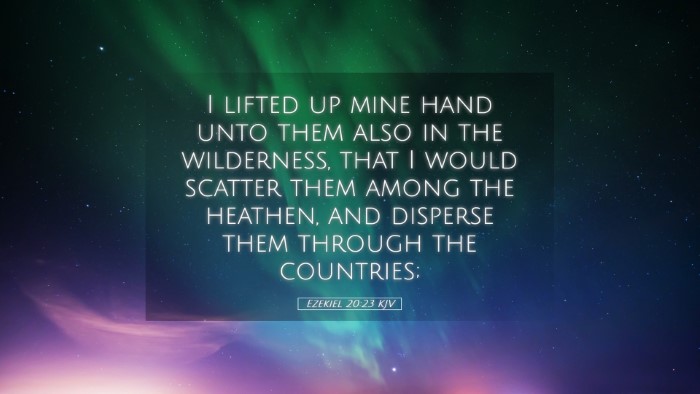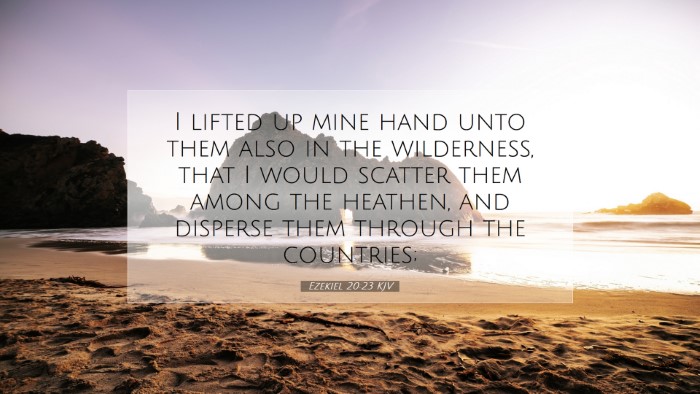Ezekiel 20:23 - A Commentary
Text of Ezekiel 20:23: "I also lifted up my hand unto them in the wilderness, that I would not bring them into the land which I had given them, flowing with milk and honey, which is the glory of all lands."
Introduction
This verse serves as a critical juncture within the prophetic writings of Ezekiel, illustrating a profound moment in Israel's history. The eloquence of the prophet provides a vivid reminder of God's sovereignty and the seriousness of his covenant relationship with Israel. In analyzing this verse through the lens of esteemed public domain commentaries, we can glean deeper insights into its theological and historical significance.
Theological Insights
Divine Sovereignty and Human Rebellion
Matthew Henry emphasizes that this verse reveals the duality of divine sovereignty and human rebellion. God's decision to withhold blessings from Israel was not arbitrary but rooted in the people's consistent disobedience. They turned away from Him despite His numerous acts of grace. This moment highlights the stark reality that while God desires to bless His people, their unfaithfulness can lead to a forfeiture of His promises.
The Wilderness Experience as a Consequence
Albert Barnes notes that the reference to the wilderness has significant implications for understanding Israel's spiritual status. The wilderness represents a place of testing, separation, and consequence. When God led the Israelites out of Egypt, He expected their faithfulness, yet they repeatedly failed to comply with His commandments. Their prolonged stay in the wilderness serves as both a physical and spiritual metaphor for their rebellion and its repercussions.
Historical Context
The Covenant and Its Significance
Adam Clarke provides historical context by reflecting on the covenant between God and Israel. The land flowing with milk and honey is symbolic of abundance and divine favor. In withholding the promised land, God is illustrating the weight of broken covenantal obligations. The severity of His actions underlines the importance of fidelity in the relationship between the Divine and His chosen people.
Judgment and Restoration
The mood of judgment is evident in Ezekiel’s message, yet it is crucial to recognize that this judgment is not the end. Matthew Henry reminds us that even within divine judgment, the possibility of restoration remains. God’s ultimate purpose is not merely retribution but a longing for Israel's return to faithfulness and communion with Him.
Divine Character
In this verse, we also see the character of God. He is not only a God of love and mercy but also one who stands firm in His righteousness. The lifting of His hand signifies a solemn oath and reflects His commitment to justice. The character of God depicted here calls believers to a deeper understanding of holiness and the necessity for repentance when one strays from His ways.
Application for Pastors and Theologians
For pastors and theologians, Ezekiel 20:23 is a poignant reminder of the consequences of unfaithfulness. It serves as a call to congregations to remain steadfast in their commitments to God. The balance between God's love and His justice must be communicated clearly, ensuring that believers grasp the importance of obedience in their relationship with Him.
- Call to Faithfulness: Pastors should encourage their congregations to reflect on their personal walk with God, emphasizing the importance of faithfulness in the face of trials.
- The Importance of Repentance: This passage opens discussions on the themes of repentance and grace. The understanding that God desires restoration can be a source of hope for many.
- Consequences of Disobedience: It is vital to teach that while God's mercy is vast, there are still consequences for turning away from His commandments.
Conclusion
Ezekiel 20:23 encapsulates a significant theme in the prophetic literature: the seriousness of God's covenant with His people. The interplay between divine judgment and the hope for restoration provides a rich platform for theological exploration and pastoral application. As scholars and pastors delve into this verse, may they find renewed insights into God's character and the responsibilities of His people.
In the final analysis, this message resonates with the New Testament understanding of grace, illustrating that even amid judgment, God’s ultimate aim is reconciliation. The challenge for today’s believers is to learn from Israel's past, uphold their commitments, and remain faithful to God’s leading.


